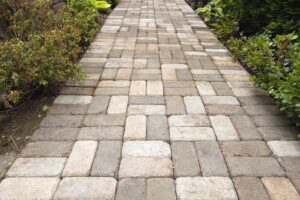
Are brick pavers right for your property? Let’s take a look at the pros and cons.
If you are in an older city like Boston, Rome, Philadelphia, or London, take a second to look at the streets and sidewalks. Most likely, they are paved with clay bricks that have been in place for over a century. These bricks are paved, but because of this, they have stood the test of time. Created from clay or shale, brick pavers are fired in a kiln at very high temperatures than walls or chimney bricks. Because of this, they are stronger and better able to withstand heavy loads. The heat also changes the pavers’ texture in a process like vitrification, making them nonporous, so they do not take on water. If you’re curious about the pros and cons of brick pavers for your property, you’re in the right place. Read on to learn more!
How Long Do These Bricks Last?
The brick industry offers an estimate of around 40 years, but brick-paver sidewalks in colonial-era cities have been in service under consistent traffic for close to 150 years. Because brick pavers are impervious to most kinds of damage, warranties range from about 20 to 100 years, or to none at all.
Pros of Brick Pavers
- Durability: The majority of brick pavers sold in the United States meet industry standards for compressive strength, resistance to abrasion and cracking, and minimal water absorption. Brick pavers rated for heavy vehicle traffic have a minimum compressive strength of 10,000 psi.
- Easy care: Brick pavers don’t need special upkeep, just scrub them off with a stiff-bristle brush and detergent as required to remove stains, algae, and moss.
- Eco-friendly: Compared with other building materials like concrete and manufactured stone, brick consumes less energy and produces fewer emissions. Bricks also have a very long life cycle, so they can easily last over a century. They’re frequently reclaimed and reused.
Cons of Brick Pavers
- Price: On average, brick pavers cost around 15 to 20 percent more than concrete pavers, which translates to about $320 to $430 more in materials to build an average-sized patio.
- Fewer shapes: Although they are available in a range of earth tones, brick pavers come in only a couple of sizes and fewer shapes, particularly squares and rectangles. Concrete pavers, in contrast, are offered in many colors, textures, and shapes.
Upgrade Your Home and Reach Out to Freedom Fence Today
Whether you want a brand new patio in the spring or want to install a beautiful new wood fence, Freedom Fence and Home has the expertise, competitive prices, and professional service you need. Freedom Fence and Home has over 50 years of fencing experience in the Baltimore County area, Harford County, Essex, White Marsh, and Bel Air area and we pride ourselves on giving our customers the best customer service experience possible. To see examples of our work and pick the right fence for your home, visit us online. To get started on planning your project, give us a call at (443) 271-6841, or visit us online. For more information, tips, and updates about Freedom Fence and Home, follow us on Twitter, Pinterest, and Facebook.
